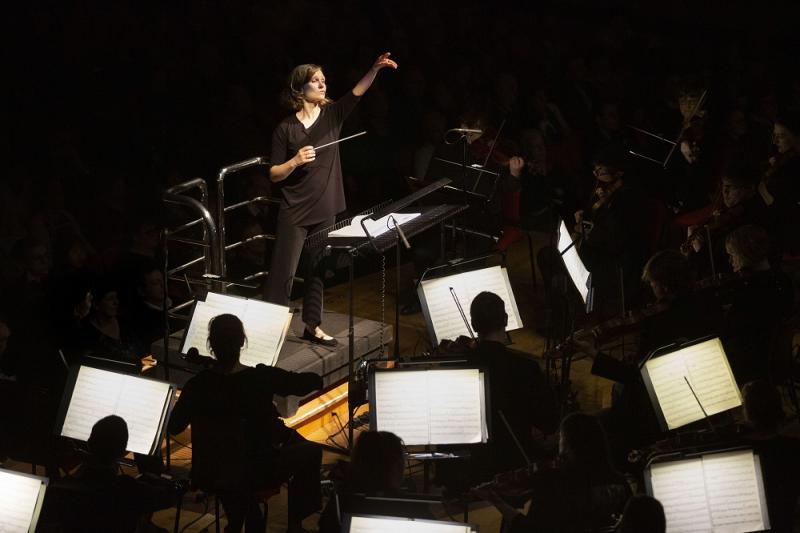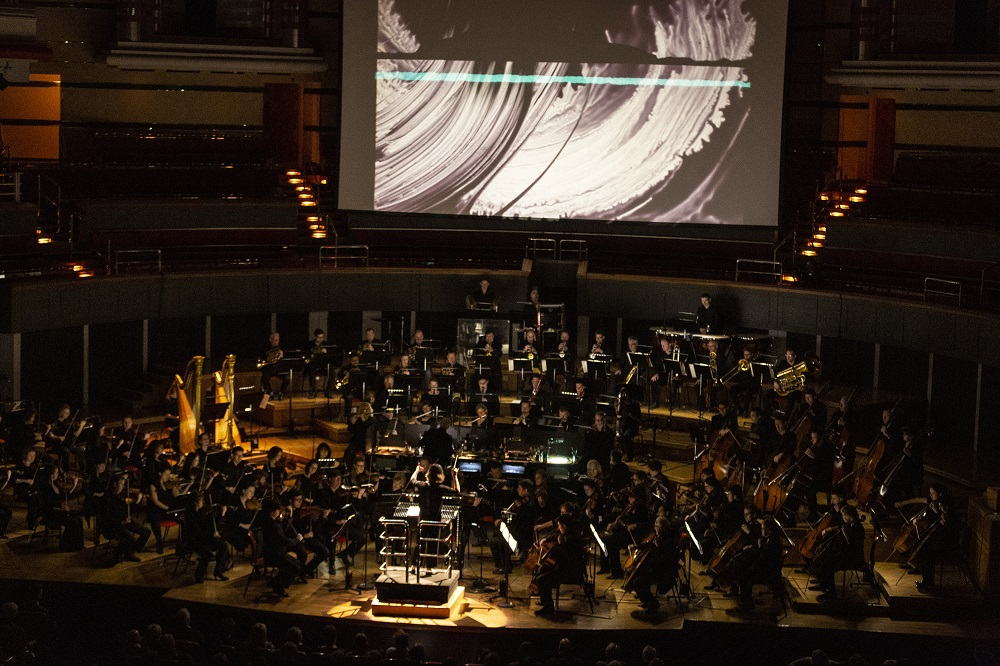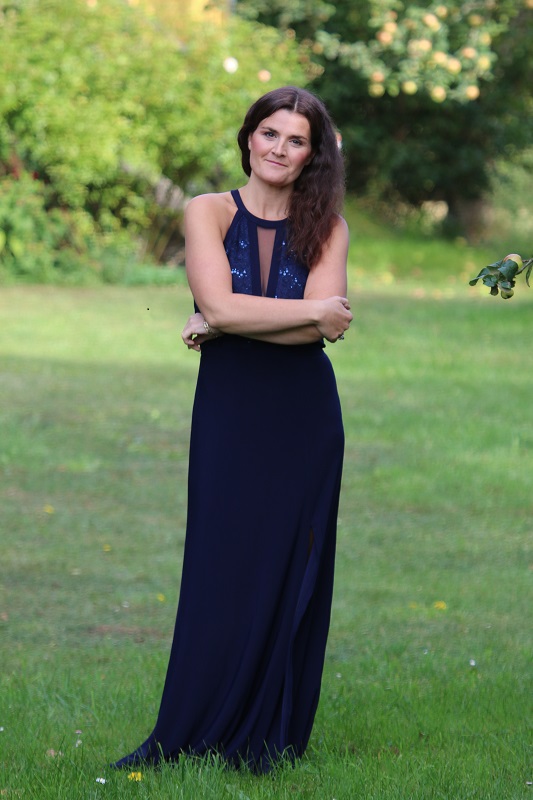Ek, CBSO, Gražinytė-Tyla, Symphony Hall, Birmingham review - epics of sea and land | reviews, news & interviews
Ek, CBSO, Gražinytė-Tyla, Symphony Hall, Birmingham review - epics of sea and land
Ek, CBSO, Gražinytė-Tyla, Symphony Hall, Birmingham review - epics of sea and land
Mirga pairs a Lithuanian late-romantic tone poem and familiar Grieg in an unusual context

British concert audiences now know and love one great Lithuanian, among the most communicative and individual conductors in the world today (note I don't even need to prefix "conductors" with "women").
Assembling the large orchestra necessary for Čiurlionis's The Sea, a work on the same scale as Strauss's Also sprach Zarathustra which partly inspired it, and then getting enough rehearsal-time to do its elaborate, many-stranded marine odyssey justice is no easy task. Complicating the audience's concentration was the decision to get Birmingham-born kinetic artist Norman Perryman to accompany it, maybe a swim too far.
 Justification lies in Čiurlionis's own painting, which overtook his (relatively small) composing oeuvre in the last years of a short life. But he kept the two apart, implying visuals we need to conjure from the music and giving his art suggestively musical titles (the 1908 triptych A Sonata of the Sea bears individual titles "Allegro", "Andante" and "Finale", pictured right). The different parts of the brain struggle to co-ordinate sound with image. Perryman has studied the score and knows what he wants at most points (the bigger picture below): a large orange suns burns before the central storm, a moonscape follows it. But there are more moments of stasis than in the music or indeed in the sea itself, and to end with sludge brown when Čiurlionis has a bright-blue or green E major seemed like one of several non-correspondences (so much for the artist's synaesthesia).
Justification lies in Čiurlionis's own painting, which overtook his (relatively small) composing oeuvre in the last years of a short life. But he kept the two apart, implying visuals we need to conjure from the music and giving his art suggestively musical titles (the 1908 triptych A Sonata of the Sea bears individual titles "Allegro", "Andante" and "Finale", pictured right). The different parts of the brain struggle to co-ordinate sound with image. Perryman has studied the score and knows what he wants at most points (the bigger picture below): a large orange suns burns before the central storm, a moonscape follows it. But there are more moments of stasis than in the music or indeed in the sea itself, and to end with sludge brown when Čiurlionis has a bright-blue or green E major seemed like one of several non-correspondences (so much for the artist's synaesthesia).
But is the music any good? It's ambitious, certainly, if over-indebted to Strauss at points. More worrying to me live than in the three recordings I've heard was the excess of thick orchestral organ pedals (Birmingham's king of instruments comes into its own at times, too). But there seems to be real genius in the nocturnal barcarolle of the last third, woodwind and string wisps of real individuality tossed on a by now gentler ocean. Mirga's perfect balance between phrase-shaping and keepin the whole afloat was much in evidence here. You really do sense a poetic response to infinity, one which deserves to end quietly, fading to nothingness, rather than with the conventional late-romantic apotheosis, cymbals crashing again, which Čiurlionis - mistakenly, I think - decided upon.  The full orchestra required left us with rather larger than usual forces - 16 first vioins, for a start - in the Peer Gynt sequence. Mirga turned them to striking advantage, bearing in mind that the numbers were shorn of their dramatic context, by essaying laments of Mahlerian scale for the bride abducted and deserted by bad lad Peer and the dying mother whose end he tries to ease with a story of a journey to heaven's gate. Her already celebrated sense of continuity gave us telling pairs of movements: the wedding celebrations of the Overture/Prelude, with stamping colleagues for viola-player Adam Romer's splendid Hardanger fiddle impersonations, and the same music knife-twisted for Ingrid's plaint; Åse's death followed by bright morning; Solveig's tender song obliterated by the storm scene of Peer's homecoming, only for tender redemption to win out.
The full orchestra required left us with rather larger than usual forces - 16 first vioins, for a start - in the Peer Gynt sequence. Mirga turned them to striking advantage, bearing in mind that the numbers were shorn of their dramatic context, by essaying laments of Mahlerian scale for the bride abducted and deserted by bad lad Peer and the dying mother whose end he tries to ease with a story of a journey to heaven's gate. Her already celebrated sense of continuity gave us telling pairs of movements: the wedding celebrations of the Overture/Prelude, with stamping colleagues for viola-player Adam Romer's splendid Hardanger fiddle impersonations, and the same music knife-twisted for Ingrid's plaint; Åse's death followed by bright morning; Solveig's tender song obliterated by the storm scene of Peer's homecoming, only for tender redemption to win out.

The full works of the complete incidental music to Ibsen's epic would have given us those melodramas where Grieg comes closest to the playwright's darker supernatural satire; but then that would have taken a whole evening, and to have the bonus of a Lithuanian rarity was of inestimable value. And who else but Mirga could sign up for a contract with a major record-company (Deutsche Grammophon) and insist on the tough Weinberg symphony she conducted so powerfully earlier this season for her first release and music by contemporary Lithuanian composer Raminta Šerkšnytė for her second. That will take her back to Lithuania, but the Birmingham side of things is secure and assured; after Rattle, Oramo and Nelsons, the CBSO is already well into yet another golden age.
rating
Explore topics
Share this article
The future of Arts Journalism
You can stop theartsdesk.com closing!
We urgently need financing to survive. Our fundraising drive has thus far raised £49,000 but we need to reach £100,000 or we will be forced to close. Please contribute here: https://gofund.me/c3f6033d
And if you can forward this information to anyone who might assist, we’d be grateful.

Subscribe to theartsdesk.com
Thank you for continuing to read our work on theartsdesk.com. For unlimited access to every article in its entirety, including our archive of more than 15,000 pieces, we're asking for £5 per month or £40 per year. We feel it's a very good deal, and hope you do too.
To take a subscription now simply click here.
And if you're looking for that extra gift for a friend or family member, why not treat them to a theartsdesk.com gift subscription?
more Classical music
 Two-Piano Gala, Kings Place review - shining constellations
London Piano Festival curators and illustrious friends entertain and enlighten
Two-Piano Gala, Kings Place review - shining constellations
London Piano Festival curators and illustrious friends entertain and enlighten
 Echo Vocal Ensemble, Latto, Union Chapel review - eclectic choral programme garlanded with dance
Beautiful singing at the heart of an imaginative and stylistically varied concert
Echo Vocal Ensemble, Latto, Union Chapel review - eclectic choral programme garlanded with dance
Beautiful singing at the heart of an imaginative and stylistically varied concert
 Scott, Irish Baroque Orchestra, Whelan, RIAM, Dublin review - towards a Mozart masterpiece
Characteristic joy and enlightenment from this team, but a valveless horn brings problems
Scott, Irish Baroque Orchestra, Whelan, RIAM, Dublin review - towards a Mozart masterpiece
Characteristic joy and enlightenment from this team, but a valveless horn brings problems
 Classical CDs: Voice flutes, flugelhorns and froth
Baroque sonatas, English orchestral music and an emotionally-charged vocal recital
Classical CDs: Voice flutes, flugelhorns and froth
Baroque sonatas, English orchestral music and an emotionally-charged vocal recital
 Kanneh-Mason, Britten Sinfonia, Shave, Milton Court - a grin and a big beaming smile
A pair of striking contemporary pieces alongside two old favourites
Kanneh-Mason, Britten Sinfonia, Shave, Milton Court - a grin and a big beaming smile
A pair of striking contemporary pieces alongside two old favourites
 theartsdesk at the New Ross Piano Festival - Finghin Collins’ musical rainbow
From revelatory Bach played with astounding maturity by a 22 year old to four-hand jazz
theartsdesk at the New Ross Piano Festival - Finghin Collins’ musical rainbow
From revelatory Bach played with astounding maturity by a 22 year old to four-hand jazz
 First Person: Manchester Camerata's Head of Artistic Planning Clara Marshall Cawley on questioning the status quo
Five days of free events with all sorts of audiences around Manchester starts tomorrow
First Person: Manchester Camerata's Head of Artistic Planning Clara Marshall Cawley on questioning the status quo
Five days of free events with all sorts of audiences around Manchester starts tomorrow
 Goldscheider, Brother Tree Sound, Kings Place review - music of hope from a young composer
Unusual combination of horn, strings and electronics makes for some intriguing listening
Goldscheider, Brother Tree Sound, Kings Place review - music of hope from a young composer
Unusual combination of horn, strings and electronics makes for some intriguing listening
 theartsdesk Q&A: composer Donghoon Shin on his new concerto for pianist Seong-Jin Cho
Classical music makes its debut at London's K-Music Festival
theartsdesk Q&A: composer Donghoon Shin on his new concerto for pianist Seong-Jin Cho
Classical music makes its debut at London's K-Music Festival
 Helleur-Simcock, Hallé, Wong, Bridgewater Hall, Manchester review - moving lyricism in Elgar’s concerto
Season opener brings lyrical beauty, crisp confidence and a proper Romantic wallow
Helleur-Simcock, Hallé, Wong, Bridgewater Hall, Manchester review - moving lyricism in Elgar’s concerto
Season opener brings lyrical beauty, crisp confidence and a proper Romantic wallow

Comments
Great concert and review. I
Thanks very much for that
Thanks very much for that information. I'll correct. Interesting for the folk style...
Referring to a female
Nonsense. It's something she
Nonsense. It's something she's encouraged, and it's how she's known in Birmingham. FYI they tried Andris in a poster campaign in Leipzig - if you are who you say you are, I'd have thought you'd have known that - and I've no idea how it's caught on there. In this case it has nothing to do with her sex and everything to do with the difficulties of pronouncing her surname. Nobody seems to have had a problem with 'Malala'.
At the CBSO we've got a long
I agree completely with your